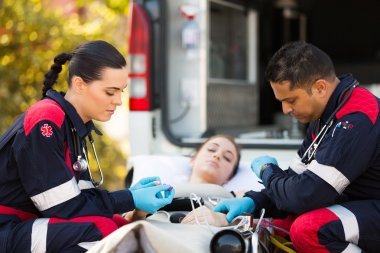First responders are the people who first respond to the scene of any emergency, such as an accident, natural disaster, or violent attack.
They are the first to arrive and provide assistance to victims of medical emergencies. Occupations that can be classified as first responders include law enforcement officers, paramedics, emergency medical technicians (EMTs), and firefighters.
These first responders face many life-threatening situations in the performance of their duties, as well as having to see Many painful moments.
This article discusses some important mental health tips for first responders.
Sure, almost everyone knows how to improve their physical health, but keeping mental health alive is more vital, especially for first responders.
A study reported that 85% of first responders often experience mental health problems. Depression and PTSD are said to be up to 5 times more common in first responders.
Mental health issues increase the likelihood of cancer and cardiovascular disease, as well as premature death.
This is no longer a secret. First responders must maintain their composure at all times.
As a mental health first responder, you can use these simple yet powerful methods to boost your mental well-being.
1. Get a good night’s sleep
Sleep disorder has a direct impact not only on physical but also on mental health.
First responders, like everyone else, are more likely to have a mental health problem if they don’t get enough sleep.
It is important to note that melatonin is the key to weight loss and youth retention. Your sleep routine needs to be adjusted.
Initially, sleep should last 7-8 hours. Second, you should be disciplined about sleeping and waking up at the same time every day.
2. Set firm work-life boundaries
First responders face a unique challenge as their work often follows them home.
It is vital to their mental health that they set clear boundaries between their professional and personal lives.
Doing so can prevent burnout and ensure they remain effective and compassionate in their roles.
3. Regular exercise
The stress of being a first responder can be overwhelming. Regular exercise can act as a stress reliever, helping to clear the mind and reduce the risk of anxiety and depression.
It is a simple but effective way of maintaining physical and mental health.
4. Prioritize mindfulness and meditation
With the high-pressure environment in which first responders operate, finding calm can be a challenge.
Mindfulness and meditation can provide a mental break, allowing them to reset and refocus, which is essential for maintaining mental clarity in the face of constant stress.
5. Manage workloads
The nature of your job as a first responder can lead to long hours and a heavy workload.
It is important to manage these workloads effectively and take regular breaks to prevent stress building up to unmanageable levels.
6. Build resilience
Resilience is key for first responders, who often face difficult and traumatic situations.
The simple truth is that building resilience can help you better cope with and recover from the stressors of your job, which is essential for long-term mental health and career viability.
7. Seek professional support
For first responders, exposure to traumatic events is not an occasional occupational hazard, but a routine part of the job.
They are on the front lines of crises, witnessing human suffering and life-threatening situations that can leave indelible marks on their psychological well-being.
Professional support, in the form of therapy or counseling, provides a confidential and safe space for first responders to process these experiences.
In a profession where mental toughness is often prized, acknowledging the need for help is a sign of strength.
Final thoughts
As much as you devote all of your time, energy, and expertise to serving other people, you must first take care of yourself, especially your mental health. You have to guide it at all times. Hopefully the tips in this article will help you keep your sanity intact.
